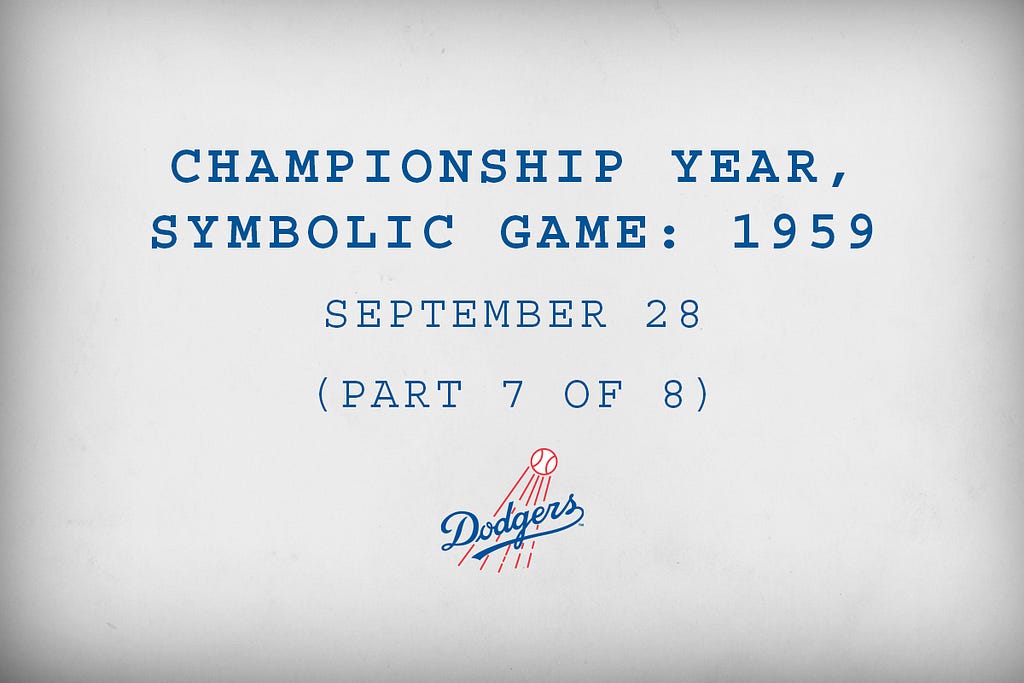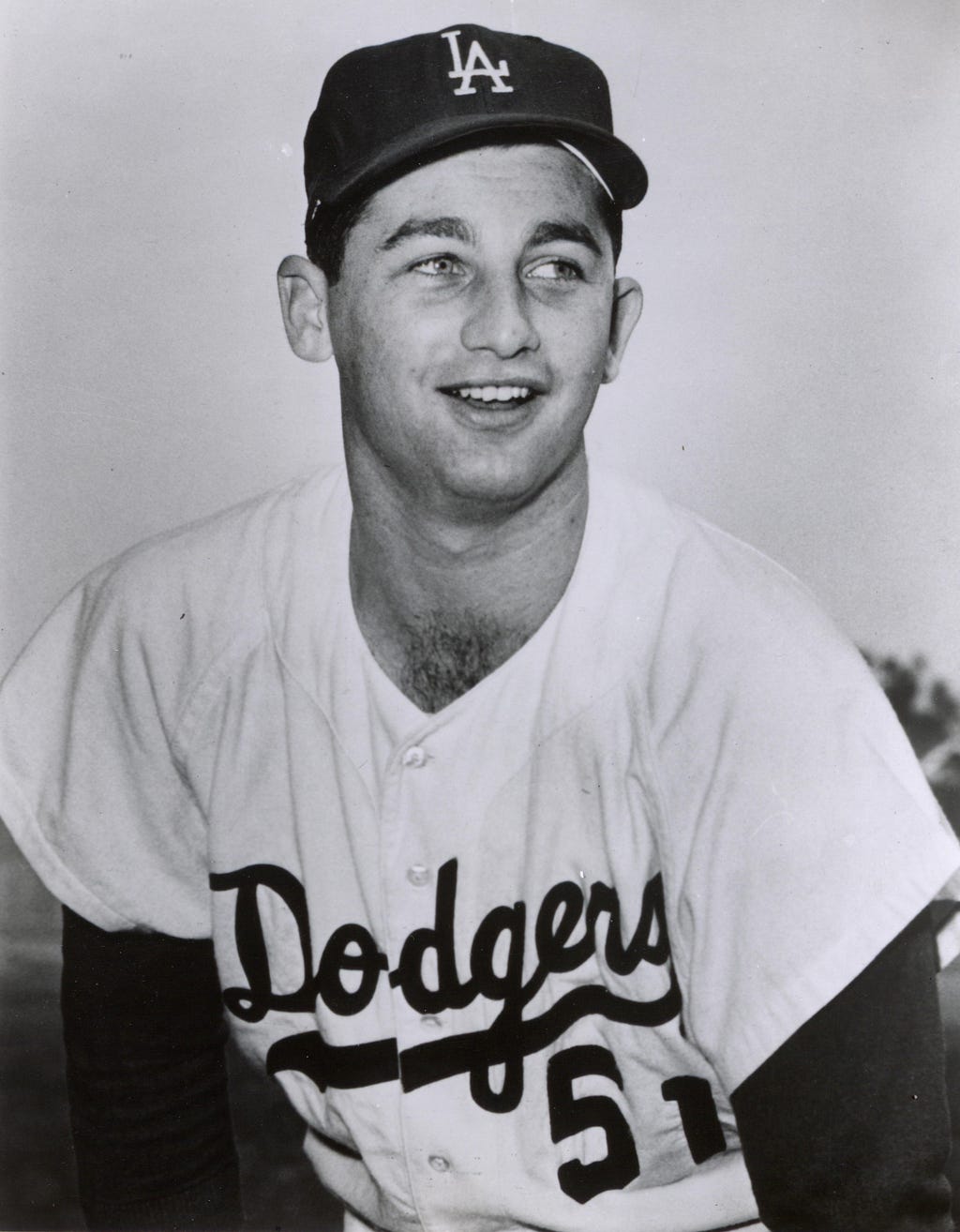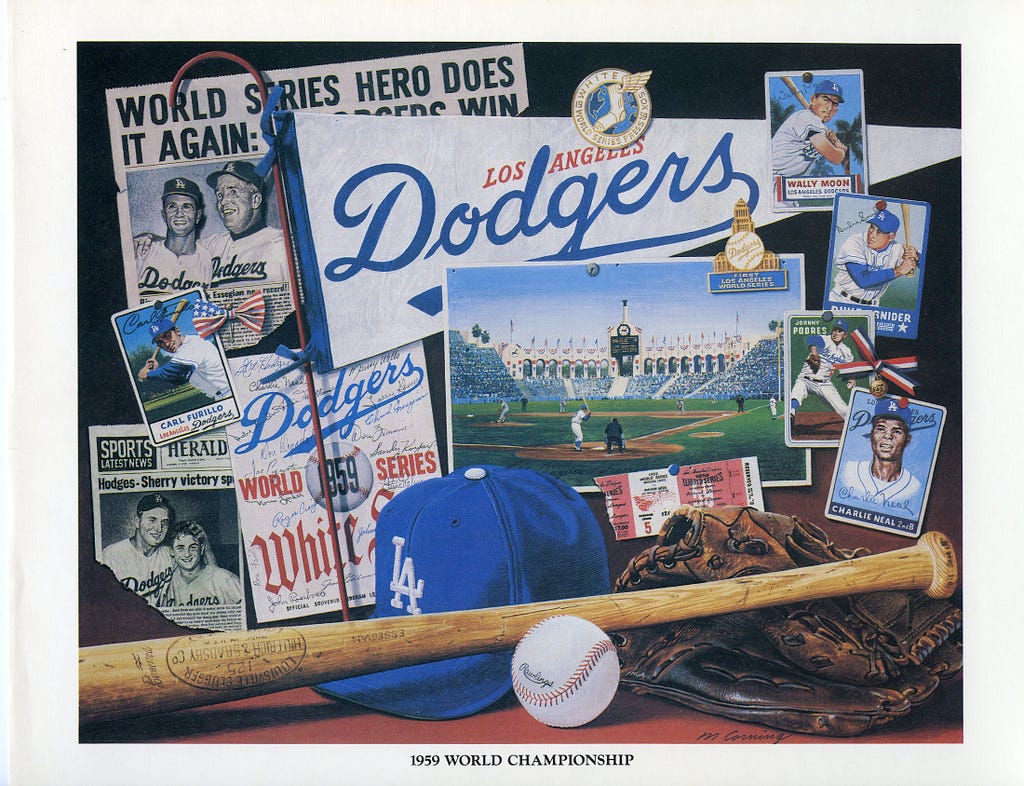1959 Championship Year, a Symbolic Game: Los Angeles surprise party

The Dodgers’ eight World Series championships are individually worthy of a movie. With that in mind, we continue with part seven of an eight-part series that takes one regular season game — a microcosm game for the team’s championship season — and treat it like a screenplay to a movie. The following is a true story of the 1959 World Series champions. The game is Dodgers vs. Braves, Sept. 28, 1959.
by Mark Langill
The roster labeled him a rookie. His 23-year-old face said veteran.
Larry Sherry had been through a lot on his way to become a Dodger pitcher in the 1959 National League pennant race.
There were the usual Minor League challenges facing any young prospect — limited auditions, the bad first impressions still carried by executives ready to move onto the next arm, etc.
Sherry stood atop a mound at County Stadium in Milwaukee. It was the biggest moment of his baseball life — big game, tiebreaker series, late September.
The rookie’s pitching motion was very mechanical, almost robotic.
It began with a triangle — his glove at the cap, arms out and elbows pointed in opposite directions. At 6-foot-2 and 200 pounds, Sherry stood upright. During the delivery, there was very little bend in his back. No big leg kick. His flannel jersey with the number 51 remained stiff, like the hanger was still in the uniform.

The crescendo of his delivery was a violent flip of his hand, his right hand releasing the baseball, the head snapping sideways as his right foot landed on the ground.
Was he still mad?
Was he in a hurry, making up for lost time?
Sherry was born with club feet, a condition which required surgeries and wearing special shoes until he was age 12. Although it was a challenge to walk, Sherry was determined to compete with his three older brothers while growing up in Southern California.
As the youngest at the dinner table, Sherry didn’t think twice when there was just one piece of cake left at the dinner table. He spit on the dessert to avoid a shutout.
One afternoon, his brothers played a pickup baseball game with the neighborhood kids and didn’t invite Sherry. But they broke their bat during the game and circled back to Sherry, who had his own lumber.
They asked for it. Sherry said no dice and soon began the chase.
He broke into a sprint before suddenly stopping at a tree. With a mighty swing, he gave the trunk a whack, which produced a crack in the bat.
“Here, now you can use it,” he announced, holding the broken piece of timber.
It took a while for the Dodgers to want Sherry for their games, at least at the Major League level. He signed as an amateur free agent in 1953 after his baseball and basketball career at Fairfax High School.
His Major League debut in 1958 coincided with the Dodgers’ first season on the West Coast. But great expectations surrounding the famous baseball team from Brooklyn fizzled when the Dodgers finished in a seventh-place tie. Sherry’s five games in 1958 didn’t inspire, and he was back in the Minor Leagues by mid-May.
After a disappointing seventh-place finish in 1958, the Dodgers gave their new fan base a thrilling pennant race in 1959. Sherry didn’t join the bandwagon until his July 4 promotion from Triple-A St. Paul as part of a roster shuffle necessitated by the retirement of veteran pitcher Carl Erskine in mid-June.
Although he was a disappointing 6–14 at Triple-A Spokane in 1958, Sherry developed a slider during the offseason while playing winter ball in Cuba. Sherry’s tutor was Norm Sherry, his brother who was a catcher in the Dodger organization.
The new pitch also made a believer of 72-year-old Dodger scout John Corriden, who was sent on special assignment by Los Angeles general manager Buzzie Bavasi in June 1959 to find a relief pitcher in the Dodger Minor League system. Corriden evaluated several farm clubs and called Bavasi and recommended Sherry, who was having an average season at Triple-A St. Paul.
“C’mon, John. He’s been with us for two years, and he can’t pitch” Bavasi told Corriden.
The scout, a baseball lifer who had spent 52 years in professional baseball, stood his ground.
“What are you paying me for Buzzie? You want information, and I’m giving it to you. If you don’t bring him up to the Dodgers, then I quit, so help me.”
The new version of Sherry on the 1959 roster gave manager Walter Alston a workhorse who was comfortable in both the starting rotation and the bullpen.
When the Dodgers and Milwaukee Braves ended the regular season with 86–68 records, a playoff was needed to decide the league champion. National League rules dictated a best-of-three format, with games counting toward the regular-season record, while the American League was content to play just one game for its tiebreaker.
Because of these contrasting tiebreakers, Alston didn’t need to use his best starting pitcher on Sept. 28 when the series opened at Milwaukee’s County Stadium.
Alston chose Danny McDevitt, reasoning the left-hander had a better chance in Milwaukee rather than pitching at the Los Angeles Memorial Coliseum, where the left-field fence was just 251 feet from home plate. By starting McDevitt, Alston had right-handers Roger Craig and Don Drysdale available when the series moved to Los Angeles for the second and potential third game.
There were only 18,297 fans in attendance on Sept. 28 in Milwaukee. Maybe the Braves fans were waiting for the World Series. Why fight the chilly conditions and a Monday morning rainstorm?
The Dodgers scored a run in the first inning off right-hander Carlton Willey on Norm Larker’s two-out single, which brought home Charlie Neal from second base.
The 1–0 lead didn’t last long. The Braves scored two runs in the second inning on two hits, a walk, an error and a fielder’s choice.
Although it wasn’t an elimination game, Alston wasn’t afraid of using a quick hook. He also knew Sherry could give him innings.
The Dodgers tied the game in the third inning on an RBI single by Gil Hodges. In the sixth inning, John Roseboro’s solo home run off Willey gave Sherry the lead.
Batter after batter, it was the triangle to the hanger to the violent flip of the hand. The robot still had a full battery into the ninth inning.
Finally, it was Sherry vs. Bobby Avila — the former American League batting champion in the final year of his career.
Sherry threw one pitch. Avila popped out.
The rookie shook teammates hands like it was the end of business meeting.
The Dodgers were now one win from the World Series and meeting the Chicago White Sox, and it was clear — the rookie from Los Angeles could end up being a big piece of the championship pie.

1959 Championship Year, A Symbolic Game: Los Angeles Surprise Party was originally published in Dodger Insider on Medium, where people are continuing the conversation by highlighting and responding to this story.
